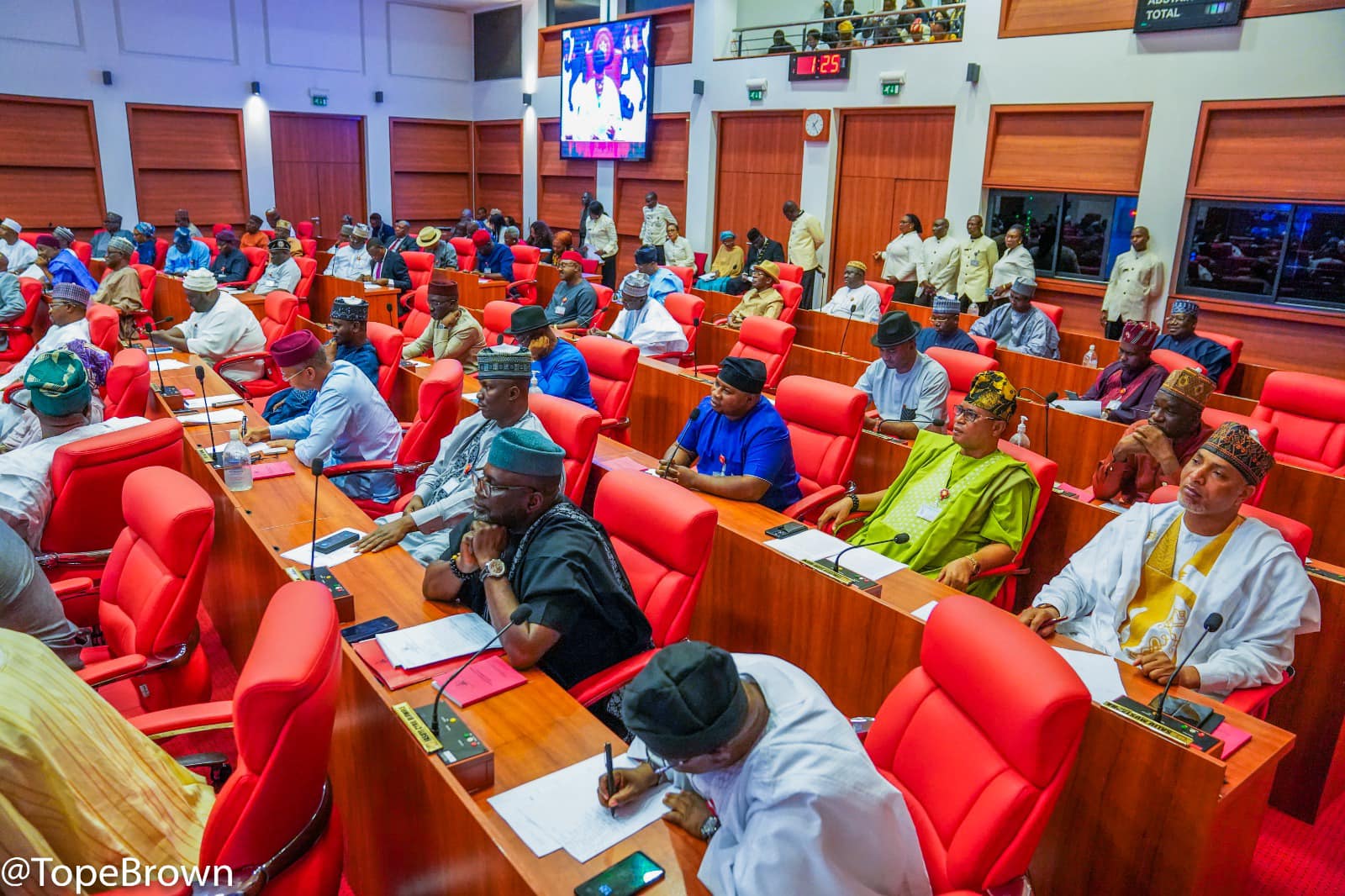The Senate has urged the Federal Government to take immediate action to alleviate the widespread hunger and food insecurity that have reached a crisis point, declaring the situation a national emergency that requires swift and effective intervention.
The upper chamber admonished President Bola Tinubu to take swift and decisive action to address the pressing issue of food insecurity in the country, proposing specific measures to mitigate the crisis.
The Senate also cautioned that while Nigerians have been patient and tolerant in the face of hunger and poverty, their forbearance has limits and is wearing thin.
They sounded a dire warning, saying the country is on the brink of a crisis that could lead to unrest and chaos on the streets.
The Senate observed that there has been a sharp escalation in the prices of essential goods and household necessities over the past few months, resulting in soaring inflation rates, diminished purchasing power, and a pronounced decline in the standard of living for most Nigerians, with the overall economic situation deteriorating significantly.
They acknowledged that, as a temporary measure to alleviate the food shortage crisis, the FG has distributed 60 trucks of fertilizers to all 36 states, with each senatorial district receiving two trucks and each House of Representatives member receiving one truck, totaling 108 trucks nationwide.
Resolutions of the Senate on Tuesday were sequel to a motion titled, “Urgent Need to Address Food Insecurity and Market Exploitation of Consumables in Nigeria.”
It was sponsored by Sen. Sunday Karimi, APC-Kogi West, and co-sponsored by the Senate Whip, Senator Ali Ndume, APC-Borno South.
Sen. Sunday Karimi presented alarming statistics, highlighting that the prices of essential goods and household items have surged drastically in recent months, resulting in skyrocketing inflation, diminished purchasing power, and a stark decline in the living standards of most Nigerians.
Citing data from the National Bureau of Statistics, he revealed that food inflation has soared to a staggering 40.66% year-on-year, a significant escalation from the 24.82% recorded in May 2023, indicating a dire economic situation.
He said: The Senate is aware of the current market price of food items such as beans, maize, rice paddy, yam, tomatoes, and onions, which initially rose by about 40% after the removal of petroleum subsidies and has now increased to over 100% to 300% without any attributable reason for the increase in prices.
“The Senate is further aware that although insecurity in food-producing regions, bad roads, and an increase in the cost of transportation attributable to the removal of fuel subsidy and depreciation of the value of the naira are possible factors that have contributed to the increase in the price of food items, household commodities, and consumables,.
“The percentage increase in the cost of transportation and some of the other factors listed above is significantly less than the percentage increase in the current prices of goods all over the country.
“Concerned that the greater percentage of the increase in prices of food items and consumables in the country is not only due to these factors but also to the zest of the merchants, traders, and retailers to make supernormal profits.
“Whilst they excuse the hike in price on these factors (depreciation of the naira against the dollar, increase in price of petroleum products due to fuel price increase, and insecurity in farming regions), thereby heaping all the blame on the Federal Government.
“Notes that there is a general attitude of “Get Rich Quickly” or “Get Rich By All Means,” leading many Nigerians to jettison “being their brother’s keeper” and exploit one another to make abnormal profits.
“This attitude has been justified on the basis that many members of the political class, technocrats, and corporate elites have helped themselves with public funds without any repercussions in law. Nigerian traders have thus resorted to price gouging to maximize profits.
“Further notes that there are reports that farming communities in the border regions with other countries prefer to sell their food items abroad (to these neighbouring countries) rather than domestically (to the hinterland), thereby increasing local food insecurity.
“And concludes that all efforts made by the current Federal Executive to arrest the consistent increase in food inflation have not yielded the desired results, there is a need to be more pragmatic about addressing food insecurity, curbing herder farmer crises, kidnapping for ransom, and terrorism, and ensuring the development of a viable National Commodity Board to regulate the price of grains and ensure the elimination of artificial contributions to food and commodity inflation in Nigeria.”
In his contribution, Sen. Ali Ndume expressed concern about Nigeria’s listing among countries facing food insecurity for the first time, citing reports that suggest the country is at risk of experiencing the most severe food insecurity globally, highlighting the urgent need for action to address this critical issue.
Ndume said: “Currently, there are four countries, including Sudan and some others, that are facing very serious insecurity. Nigeria is added to this list this year by the International Rescue Committee as one of the spots for food insecurity action against hunger.
“The World Food Programme also indicated that over 32 million people are expected to face a critical hunger crisis and emerging levels between June and August.
“I don’t know about some other colleagues, but there in the North, we have started seeing it visibly. This is the first time we are experiencing this level of hunger. It’s the first time Nigeria is being listed as one of the countries with food insecurity.”
Former Senate President, Sen. Ahmad Lawan, warned his colleagues that hunger and frustration among Nigerians are palpable, cautioning that while patience and tolerance have limits, they are not infinite.
He also criticized the FG, revealing that the national food reserves are depleted and the silos are empty, emphasizing the need for urgent action to address the food crisis.
Lawan said: “Let me say here that patience and tolerance are both elastic, but they are not eternally elastic. Our students are facing real, real anger. I travelled to the two states last week, in the north particularly, and I’ve seen firsthand how people, especially those who are not in the civil service or in any business, are suffering, fighting, and struggling to have food at least once a day.
“Under normal circumstances, Mr. President, in the rainy season, from maybe June up to September or October, when there will be harvests of new foodstuffs, prices escalate. Now we don’t even have that truth. Mr. President, in today’s national daily, the executive arm of government is saying it is considering reducing or removing taxes on imported foodstuff.
“Here’s the catch. This Senate must engage the executive immediately. What are the issues? Which taxes are they talking about? Because we should be seen as doing the right thing. We have little or nothing in our food reserves across the country.
“If they come and tell us, they will distribute foodstuffs from our silos, the silos are empty. So it means we have to import food, and if we have to import, it means we need foreign exchange.
“We wouldn’t like the kind of thing that we see in our streets, and it is time that we take every possible action to get out of the situation and ensure that food floods our country—the right food.
“The government must be entirely responsible because we cannot take people for granted for too long. We have come almost to the end of the patience. And I think the elasticity is now going to snap if we are not careful.”
Senate President, Sen. Godswill Akpabio, observed that the current food insecurity crisis in Nigeria is a consequence of the pervasive insecurity that has plagued the country.
























Leave a comment